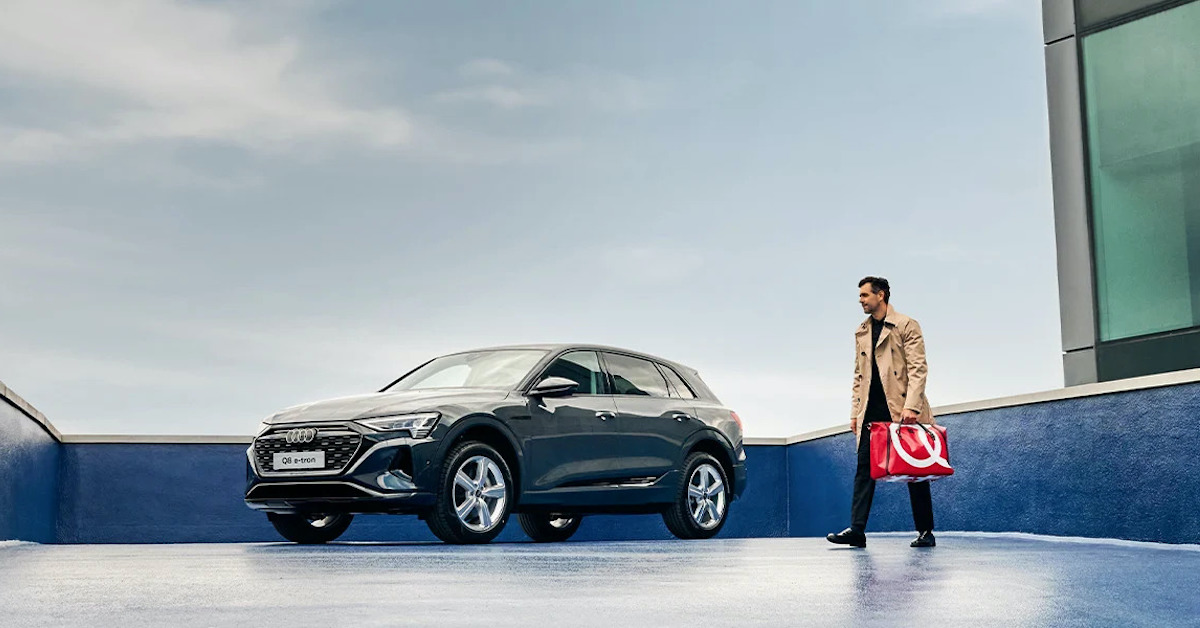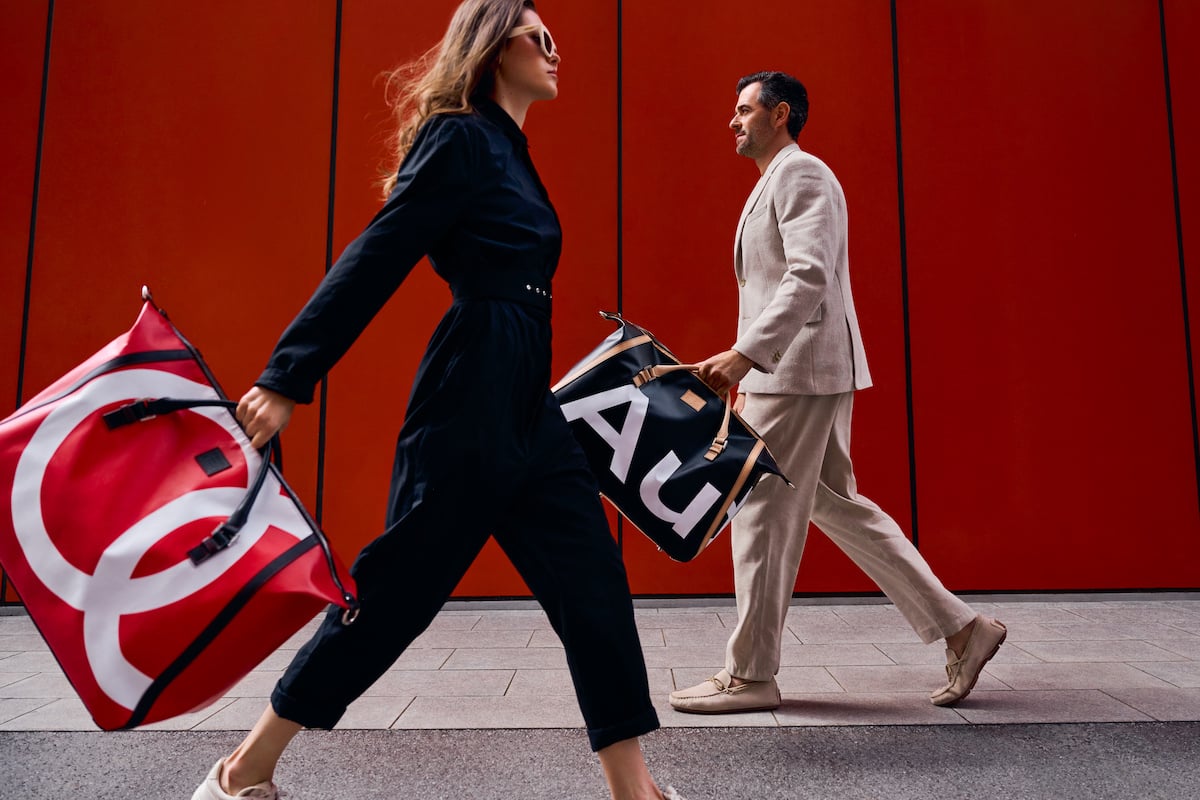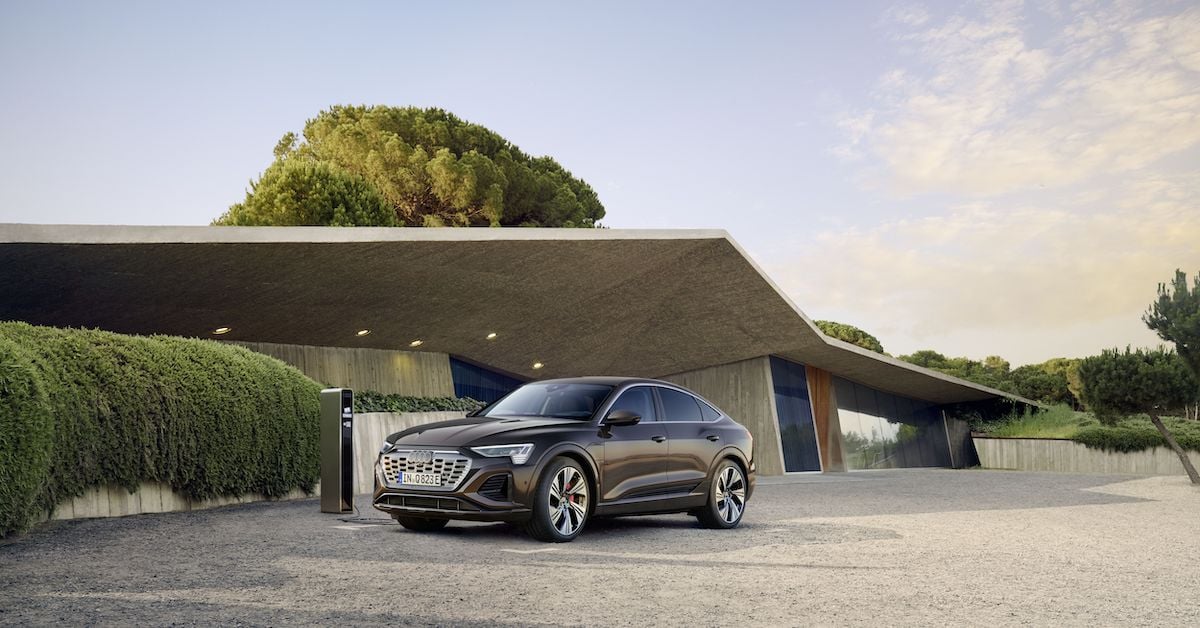.jpg)
Never Refuse to Reuse > Progress ensures we’re heading in the right direction
Progress ensures we’re heading in the right direction
The automotive industry is taking on a completely new aspect, and Audi is undoubtedly leading the way. Franci Bolta, CEO of the Audi brand in Slovenia, explains that the Audi brand is being transformed today by the drive to reduce its environmental impact. Audi is a pioneer when it comes to bringing sustainable innovations into serial production, and as employees, we have embraced the brand’s sustainable values. This is how the Audi Slovenia team came up with the idea for the Never Refuse to Reuse project, which will look for ways to reuse materials to create new, top-quality Audi products. This proves that Audi’s sustainability strategy is being implemented at all levels, and it is important that we are all working towards the same goal, which is to head in the right direction.
Napredek zagotavlja vožnjo v pravo smer
Avtomobilska industrija dobiva neko povsem novo obliko in Audi je na tem področju nedvomno nosilec razvoja. Kot je povedal direktor znamke Audi v Sloveniji, Franci Bolta, znamko danes spreminja predvsem težnja po manjšem obremenjevanju okolja. Audi je pionir, ki trajnostne inovacije uvaja v serijsko proizvodnjo vozil, trajnostne vrednote znamke pa smo ponotranjili tudi zaposleni. Tako se je v ekipi Audi Slovenija rodila tudi ideja za projekt Uporabimo uporabljeno, v okviru katerega bomo iskali načine, kako iz odsluženega materiala oblikovati nove vrhunske izdelke Audi. Dokazuje, da se trajnostna strategija znamke Audi uvaja na vseh ravneh, pomembno pa je, da pri tem vsi sledimo istemu cilju, skratka, da vozimo v pravo smer.
What drives the changes in the automotive industry today? What are the main trends?
Over the last few years, industries in general, not only the automotive industry, have focused on how to operate as sustainably as possible and with as little environmental impact as possible. The focus is on the transition to a green industry. In the automotive industry, this currently means focusing on electromobility, with a strong emphasis on harnessing green energy. This is not just about CO2 emissions and particulate matter, but also about the use of materials. We look at how materials can be recycled or reused.
Where can we notice Audi’s changes towards sustainability?
Audi takes a comprehensive approach to sustainability in many areas. For example, in vehicle production, the goal is to be carbon neutral in the near future. Our Mission:Zero program covers a wide range of areas, from water efficiency and recycling, to the production and use of green energy, and all the way to energy optimization of buildings and even logistics within factories. All train transports of new vehicles from the Neckarsulm plant are climate-neutral, and electric or fuel-efficient vehicles are used for transport between the facilities. Here too, we focus on minimizing emissions. We have already achieved carbon-neutral production of the new fully electric Audi Q8 e-tron models. The Mission:Zero program ensures that we are making progress towards the same goal of carbon neutrality. It ensures that we are moving in the right direction in all areas.
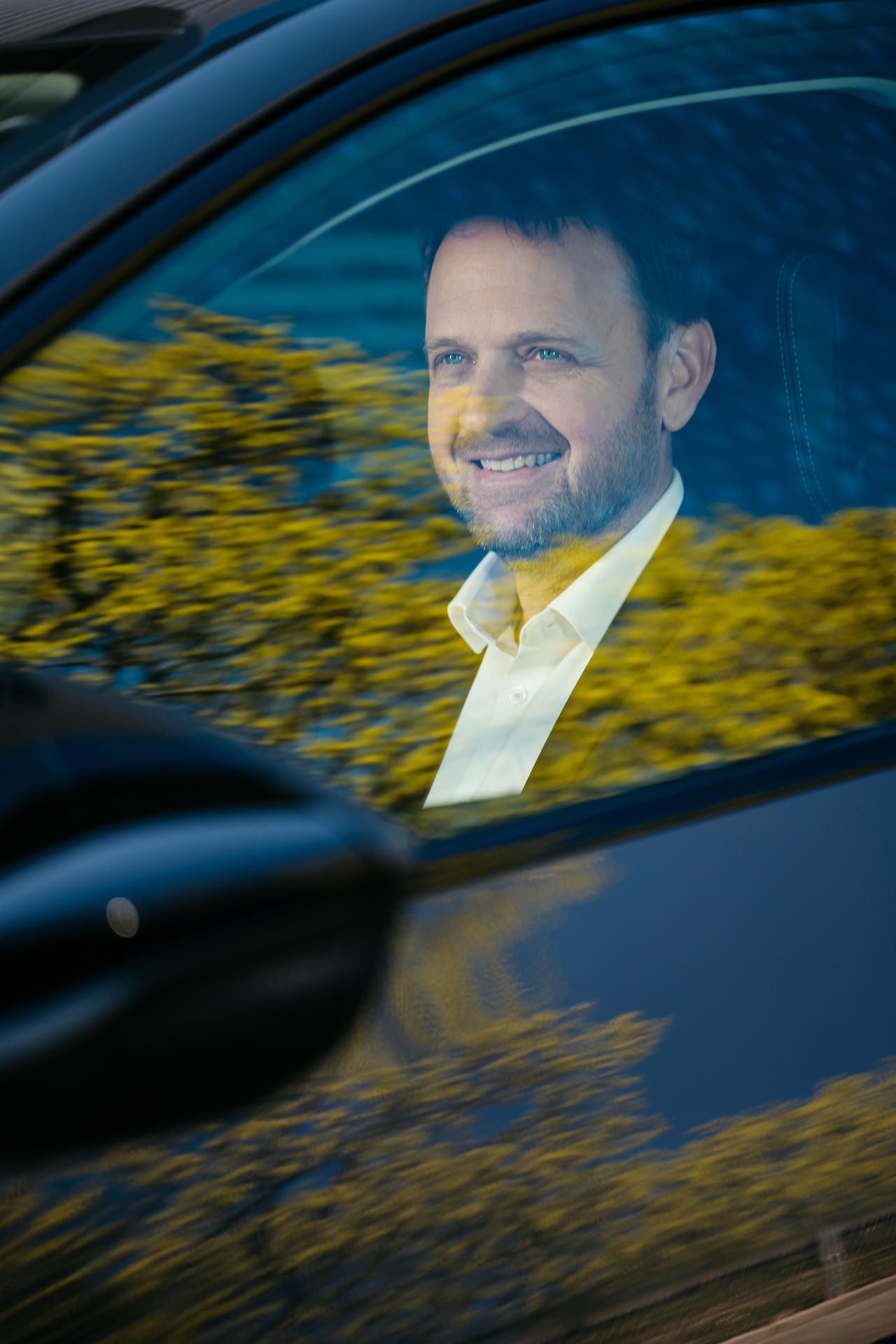
Franci Bolta, CEO of the Audi brand in Slovenia, in the fully electric Audi Q8 e-tron.
Audi Q8 e-tron:Power consumption (combined*) in kWh/100 km: 24.4–20.1 CO₂ emissions (combined*) in g/km: 0. Information on fuel/power consumption and CO₂ emissions with ranges depending on the selected equipment of the vehicle. Only consumption and emission values according to WLTP and not according to NEDC are available for the vehicle.
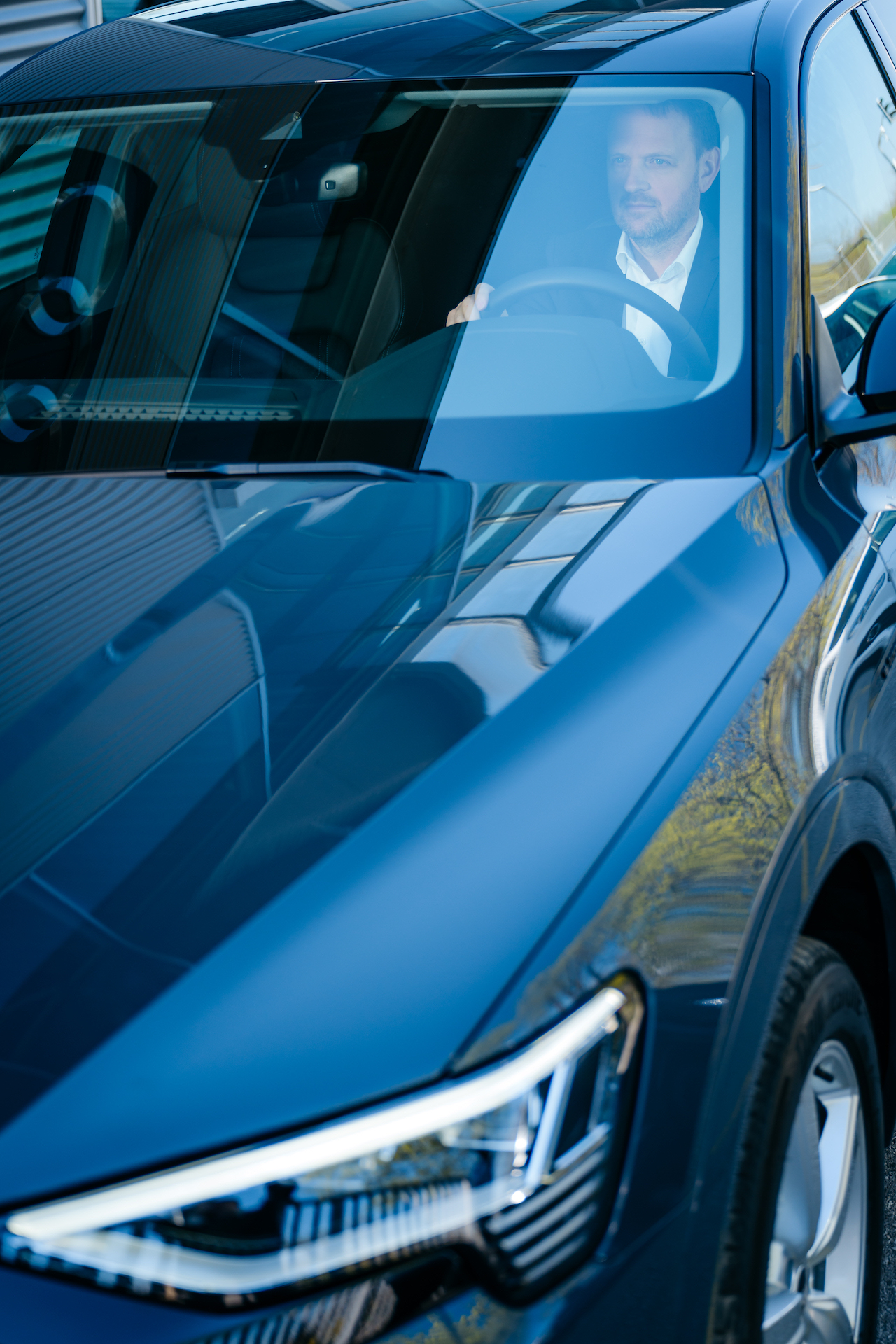
Audi is also working extensively on the circular economy. We can mention the closing of the loop of aluminum and of automotive glass, which are sustainable innovations. Can you elaborate?
Environmental responsibility is at a very high level in these areas, as well. Audi is one of the pioneers in bringing sustainable innovations into serial production. We have closed the aluminum loop by returning the aluminum sheet scrap to the supplier, who reclaims the material and remanufactures it for car production. It is estimated that secondary aluminum manufacture consumes up to 95% less energy compared to primary aluminum. Another similar project is the closed water loop, which reduces fresh water consumption by up to 70%. There are several ways to achieve this. One of the ways, for example, is the treatment and filtering of water previously used in production, and returning it back to the production once it has been treated. Moreover, there’s thoughtful use of packaging materials. Any waste foil is collected and returned to the manufacturer for recycling. The material is reprocessed into waste bags, which are then reused for waste collection in production processes.
We make great efforts to reuse secondary materials. I would also like to mention a pilot project that will allow us to reuse damaged car glass in serial vehicle production by means of a unique recycling process. This will save raw materials, as well as water and energy. The pilot project is the only such material recycling loop to date, as this type of glass is more challenging to recycle and has to meet very high standards.
Ways to reuse recycled materials are being introduced not only in automotive manufacturing, but also in other areas. This is also the case with the Never Refuse to Reuse project developed by the Audi Slovenia team. How did you develop the idea to recycle advertising banners?
It is essential that Audi’s sustainability strategy is implemented at all levels, including in internal processes. We want every employee to internalize the brand’s sustainable values and think about what they can do to impact the environment in a positive way. This is the approach each of us takes, and similarly, when considering sustainability, the Audi Slovenia team came up with the idea of using discarded advertising banners. Audi is a long-standing partner of the FIS Alpine Ski World Cup and this partnership is conveyed through banners at competitions. In the meantime, the overall image of the brand has changed, and we felt it would be a shame if used banners ended up in a landfill polluting the environment, as they are actually made of high-quality material. We thought about what we could do with them and came up with the idea of making top-quality bags that may be useful to friends of the Audi brand for years to come.
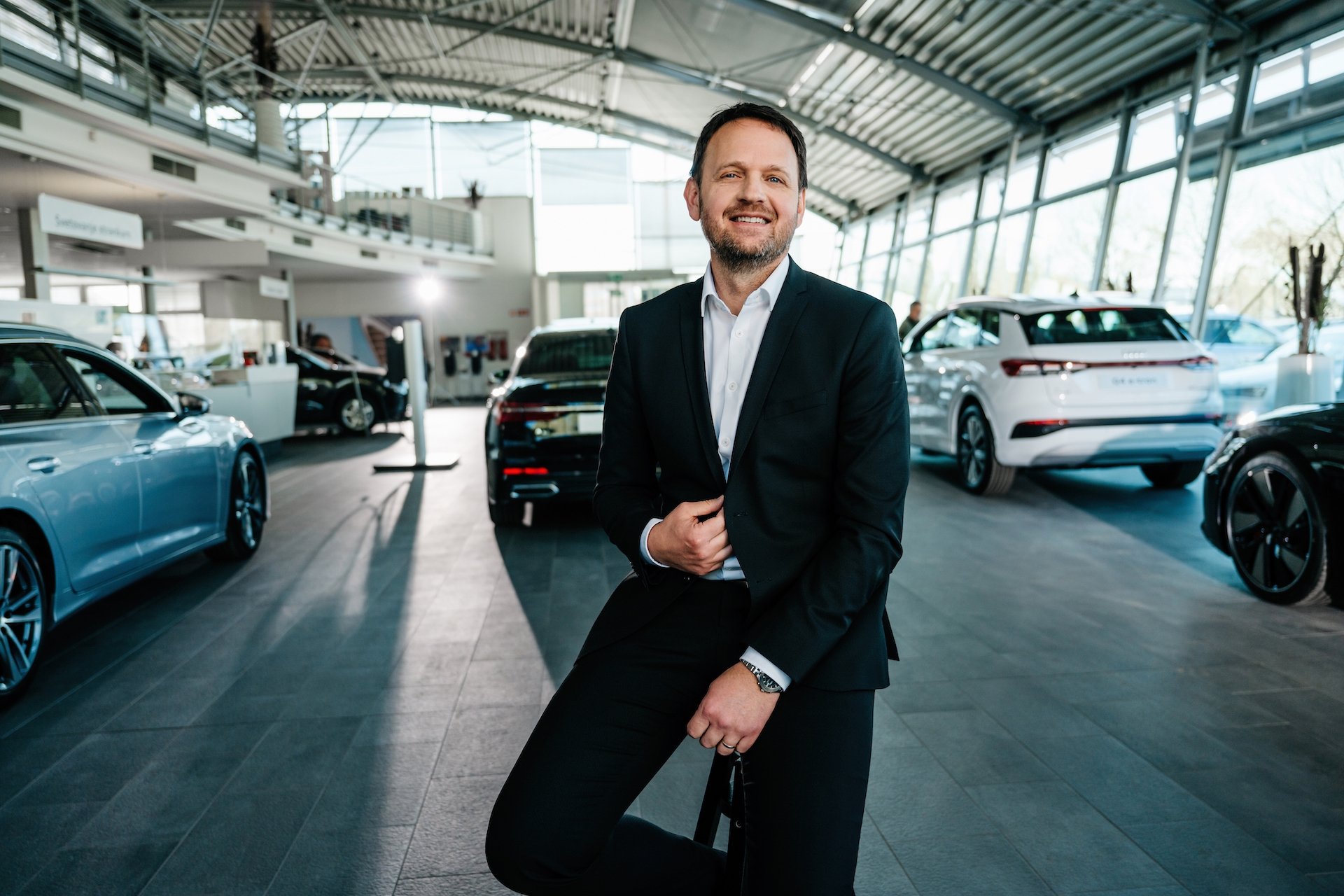
Lahko poveste več o projektu?
Že samo ime Uporabimo uporabljeno nam pove, kaj je osnovni namen projekta – uporabiti nekaj, kar že imamo in ni več v uporabi, in iz tega narediti vrhunski izdelek, ki bo tudi v novi obliki odražal vrednote znamke. Tu pa se zgodba ne konča, razmišljali smo še naprej in prišli do zaključka, da bi izkupiček od prodaje izdelkov lahko namenili sofinanciranju nekega trajnostnega projekta. Audi namreč podpira številne inovativne projekte, ki spodbujajo varstvo okolja in tako ali drugače nevtralizirajo ogljični odtis. S tem namenom je kot prvi v avtomobilski industriji ustanovil tudi neprofitno okoljsko fundacijo Audi. Kot primer projektov, ki jih podpira, lahko omenim reciklirani otok v Rotterdamu, ki odpadkom preprečuje pot do oceana, ali projekt čiščenja reke Neckar v sodelovanju s študenti. Iz pobranih odpadkov so naredili sup, ki se uporablja za promocijo oziroma ozaveščanje ljudi o pomembnosti skrbi za okolje. Je pa še veliko takih projektov.
Tudi mi smo želeli k projektu Uporabimo uporabljeno povabiti še druge partnerje, ki delijo enake vrednote kot mi in so na tak ali drugačen način povezani z znamko. Vrhunski oblikovalec in izdelovalec ročno izdelanih čevljev Mario Herzog je s svojimi dolgoletnimi izkušnjami in znanjem zagotovo prava izbira za obdelavo materiala, iz katerega so narejeni oglasni transparenti. Tudi njegova delavnica, kjer bodo ti izdelki nastajali, sledi filozofiji trajnostnega razvoja in nadgrajevanja tradicionalnega. Krog bomo sklenili z donacijo Zavodu You(r)Sea, ki že več let deluje na področju ohranjanja podvodnega habitata za morske živali v Piranskem zalivu. Prepričan sem, da bomo s tem lahko prispevali k izboljšanju kakovosti našega morja.
Pomembna je tudi sporočilna vrednost projekta. Kaj sporoča?
Glavno sporočilo je, da so naravni viri omejeni in da moramo biti pri njihovi rabi odgovorni ter narediti vse, da jih bodo lahko uporabljale tudi generacije za nami. K temu lahko veliko prispevamo s ponovno uporabo obstoječih materialov, z racionalno rabo virov. Tudi na tak način lahko uresničujemo svoje zaveze k napredku in trajnostnemu razvoju ter sprejemamo odgovornost do okolja in ljudi.
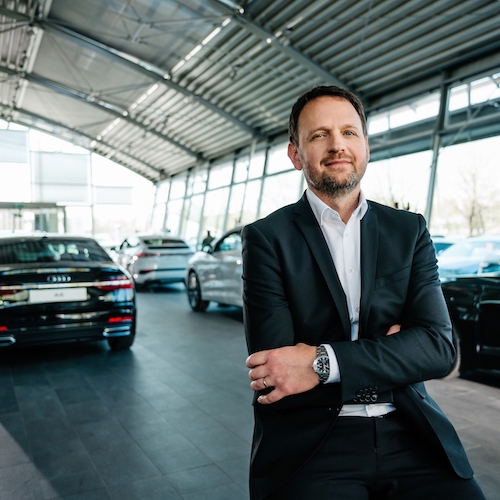
"Glavno sporočilo je, da so naravni viri omejeni in da moramo biti pri njihovi rabi odgovorni ter narediti vse, da jih bodo lahko uporabljale tudi generacije za nami."
"The main message is that natural resources are finite, and we must be responsible in their use and do everything we can to ensure that the generations after us can use them, too."
Can you tell us more about the project?
The project title "Uporabimo uporabljeno" (Never Refuse to Reuse) communicates the basic purpose of the project – to reuse something we already have and no longer use and turn it into a premium product that reflects the brand’s values in a new form. But the story doesn’t end there, as we deliberated further and came to the conclusion that the proceeds from the sale of the products should be used to co-fund a sustainable project. Audi supports a number of innovative projects that promote environmental protection and in some way neutralize the carbon footprint. With this in mind, Audi is the leading example in the automotive industry setting up the non-profit Audi Environmental Foundation. Examples of projects supported by Audi include the recycled island in Rotterdam, which prevents waste from reaching the ocean, and the Neckar River clean-up project in cooperation with students. The collected waste was made into a SUP paddle board used to promote or raise awareness about the importance of taking care of the environment. However, there are many more projects like this.
We also wanted to invite other partners who share our values and are in some way connected to our brand to join us in the Never Refuse to Reuse project. We turned to Mario Herzog, a top designer with many years of experience and expertise in crafting handmade shoes, who was surely the right person to process the material from which the banners are made. Last but not least, his workshop, where these products will be made, also follows the philosophy of sustainable development and builds on traditional approaches. We will close the loop by donating the proceeds from the bag sale to the YouSea Institute, which has been working for several years to preserve the marine animal habitat in the Piran Bay. I am confident that we will be able to contribute to improving the quality of our seas.
The message value of the project is also meaningful. What does it communicate?
The main message is that natural resources are finite, and we must be responsible in their use and do everything we can to ensure that the generations after us can use them, too. We can make a major contribution by reusing the existing materials and using resources rationally. This is also how we can deliver on our commitments to progress and sustainable development and take responsibility for the environment and people.
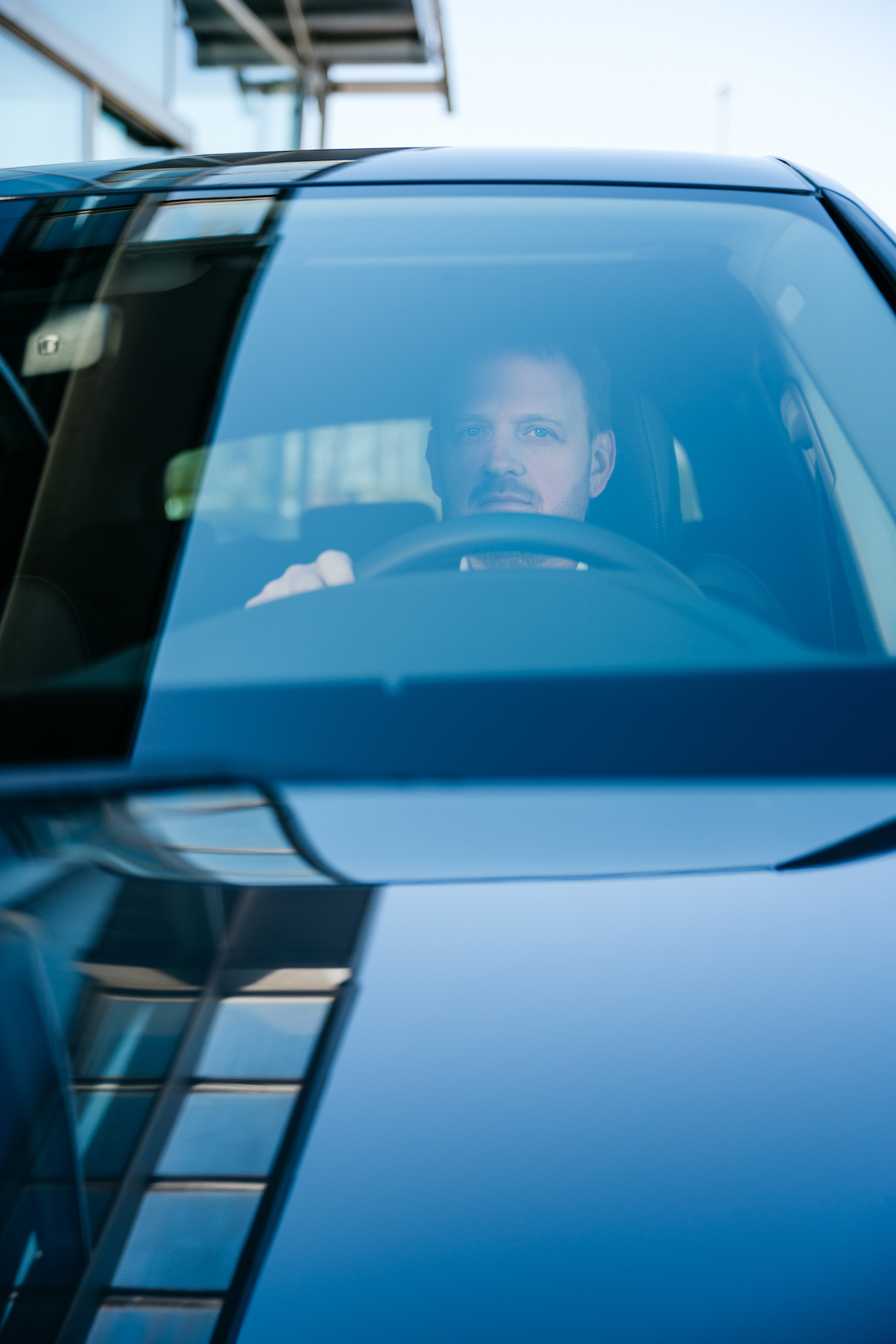

What is the vision for the project’s future?
Above all, we would like to see the project develop further and perhaps reach an international level. It has attracted a lot of interest from colleagues in other countries and we hope it will develop beyond Slovenia’s borders.
Do you think we can solve environmental challenges without applying progress?
I should think that this would be extremely difficult to achieve. I believe that progress holds the key to addressing global environmental challenges. We need to continuously evolve and be driven towards responsible behavior in all our processes and activities. I think that Audi is pursuing this very actively and effectively at all levels. It seems to me that today, society in general takes some things for granted. I nevertheless believe that the more responsible we are towards ourselves and everything around us, the better headway we will make.
What does progress mean to you personally?
Today, the pace of life is very fast, and growth is above everything. Even so, I feel it is important to acknowledge that we must act responsibly in all aspects and strive for a better future. In this spirit, progress to me means a willingness to embrace change and make it happen, to continuously broaden our horizons, to evolve, and to strive to be better in all areas. For me, progress is also about being able to spend as much quality time as possible with those who make us happy. This is also Audi’s vision.

